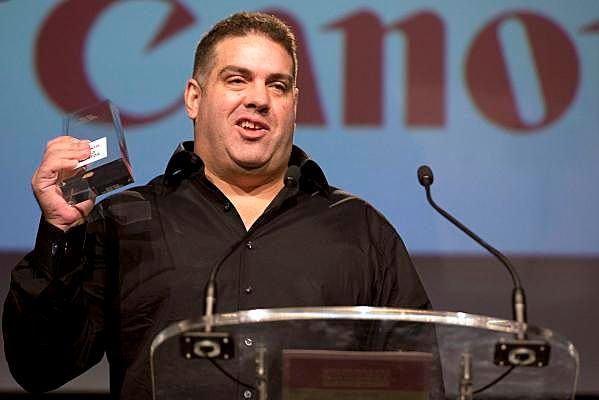My Night at the Canon Media Awards
Giovanni Tiso's brilliant take on the Canon Media Awards - and losing to Cameron Slater - reminds us that the press are still self-congratulatory, sclerotic, and consumed by their own monstrous, untethered other - though not all hope is lost.
It was the only conceivable outcome, but let me say this: you haven't lost an award until you have lost an award to Cameron Slater.
— Giovanni Tiso (@gtiso) May 9, 2014
Had I won the media award for blogger of the year, I would have been contractually obligated to acknowledge Canon, the sponsor, and incorporate its trademark in any marketing promotion such as a banner or phrase on my home page, choosing between one of two designs:
I’m not sure what the rules are around non-winners (also known as ‘losers’) featuring the logo, but I guess they’ll let me know if they mind.
I didn’t win. With the benefit of hindsight – but also of foresight – I was never going to win. And not just because the judge was Deborah Hill-Cone, at whose table I was somewhat bizarrely supposed to sit. The purpose of the exercise was always to induct Cameron Slater into official journalism, to give him the legitimacy that he at once craves and abhors. In turn, this allowed official journalism to eat a piece of his still-beating heart – in a sort of black-tie Satanic ritual – and hopefully acquire some of his powers. That was the transaction, to the point of my wondering if the category had been created for the express purpose of celebrating the man who broke the big story that other outlets were too decent to run. As if to say: ‘To you, who do our job, but without ethics.’ If not, it was almost certainly to his celebrity status – itself the product of journalism’s obsession with its monstrous double – that the prize owed its otherwise inexplicable prominence in the evening’s proceedings.
It started off with a series of bad jokes, as Hilary Barry – who otherwise did an admirable job as host – introduced the new category in her opening monologue with a vivid description of bloggers living in their mothers’ houses and ‘fornicating in front of their Macbooks’. (An earlier version of this fresh and original comedy routine can be admired in one of the cave paintings at Lescaux.) This was followed by my personal moment in the limelight, as Barry proceeded to direct to the wrong table – for by this stage I had been adopted by the wonderful Beck Eleven and the Christchurch Press delegation – a bit about how, in the event of my losing, I wasn’t to go home empty-handed: there would be a ‘Radio Live package’ ready for me, including a DVD of the best of the Willie and JT show, and so forth. This was made almost interesting by the fact that Radio Live is one of Barry’s employers. Almost, but not quite.
All of which rather begs the question of what the hell I was doing there. Do I also crave, even as I abhor it, the legitimacy that the official awards of official journalism can bestow upon outsiders and pretenders? Yes. Probably. At least to some extent. Back when I sent in my entry, which cost me nothing, I can say in good conscience that I simply wanted to see what would happen, and to be able to measure the eventual nominees against the fact that they were chosen over me. Once I was nominated, however, the exercise became an expensive one. Attending the event cost $150 dollar per head, nominees included. I tried to persuade Canon or the Newspaper Publishers’ Association to waive my fee, given that they had created a category for unwaged writers, but they weren’t interested. Then there was the cost of the plane tickets, the accommodation, abiding by the dress code. Once you added everything up, it was quite a lot of money to spend on losing an award to the guy who laughs at dead children.
Yet spend it I did. I couldn’t exactly tell you why, except by gesturing vaguely at my ongoing preoccupation with figuring out the place and role of the blog form in what is sometimes pompously referred to as the public conversation. Plus, it was bound to be a one-off, out of the ordinary experience. Absurd, yes, in the way that competitive awards for creative endeavours all are; cringe-worthy, at times, especially when it came to the many categories devoted to things of which the country has three – say, Sunday newspapers – and the best thing you could say about them is that they are differently awful; but interesting enough. For me, anyway.
In terms of legitimate content, the highlight of the evening was in the acceptance speeches by Steve Braunias and Simon Wilson, or rather the way they played against each other. First, the writer (the artist) thanked the editor for enabling him to do the work for which he was being recognised. Then, at the tail end of the presentations, the editor (the accountant) explained that he saw his job solely as selling magazines. Metro, he explained, has a full-time staff of two, not counting himself. This is the state of print journalism, and to celebrate outstanding work in the industry as if it were somehow divorced from the economic conditions of its production – the superficial business of an awards show – would be to lie about the fundamental nature of the job. Or at least that’s how I interpreted that unusual declaration of allegiance to commercial imperatives and constraints that it is rather more customary for people to lament on such occasions. It was a singularly direct way of undercutting the proceedings. The interesting bit I was looking for.
Then there was the socialising, by which I mean the drinking. It’s not easy to separate the two, nor indeed should one necessarily wish to, as the increasing levels of inebriation in the room dispensed with the natural tendency of New Zealanders – even journalist New Zealanders – to smooth themselves and avoid conflict. And so, besides the very many truly excellent people whom I was delighted to meet and talk to, there was the gallery journalist who gloriously refused to pretend not to dislike me, or the reporter who mercilessly excoriated me for my pretences. I had a terrific time, in what had suddenly become my element. The foregone conclusion of my losing to a monster was by now a thing that had already always happened: the only logical, possible outcome of a chain of events that I had been foolish enough to set in motion.
I let Shayne Currie buy me a beer, for which I’ll have to serve time in Purgatory when my day comes, and got back to my hotel at 3 am.


